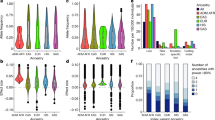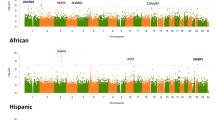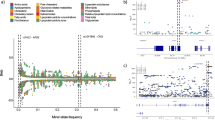Abstract
Lipids foster energy production and their altered levels have been coupled with metabolic ailments. Indians feature high prevalence of metabolic diseases, yet uncharacterized for genes regulating lipid homeostasis. We performed first GWAS for quantitative lipids (total cholesterol, LDL, HDL, and triglycerides) exclusively in 5271 Indians. Further to corroborate our genetic findings, we investigated DNA methylation marks in peripheral blood in Indians at the identified loci (N = 233) and retrieved gene regulatory features from public domains. Recurrent GWAS loci—CELSR2, CETP, LPL, ZNF259, and BUD13 cropped up as lead signals in Indians, reflecting their universal applicability. Besides established variants, we found certain unreported variants at sub-genome-wide level—QKI, REEP3, TMCC2, FAM129C, FAM241B, and LOC100506207. These variants though failed to attain GWAS significance in Indians, but largely turned out to be active CpG sites in human subcutaneous adipose tissue and showed robust association to two or more lipid traits. Of which, QKI variants showed significant association to all four lipid traits and their designated region was observed to be a key gene regulatory segment denoting active transcription particularly in human subcutaneous adipose tissue. Both established and novel loci were observed to be significantly associated with altered DNA methylation in Indians for specific CpGs that resided in key regulatory elements. Further, gene-based association analysis pinpointed novel GWAS loci—LINC01340 and IQCJ-SCHIP1 for TC; IFT27, IFT88, and LINC02141 for HDL; and TEX26 for TG. Present study ascertains universality of selected known genes and also identifies certain novel loci for lipids in Indians by integrating data from various levels of gene regulation.
Similar content being viewed by others
Login or create a free account to read this content
Gain free access to this article, as well as selected content from this journal and more on nature.com
or
References
Mooradian AD. Dyslipidemia in type 2 diabetes mellitus. Nat Clin Pract Endocrinol Metab. 2009;5:150–9.
Benjamin EJ, Virani SS, Callaway CW, Chamberlain AM, Chang AR, Cheng S, et al. Heart disease and stroke statistics - 2018 update: a report from the American Heart Association. Circulation. 2018;137:E67–E492.
Burnett JR. Lipids, lipoproteins, atherosclerosis and cardiovascular disease. Clin Biochem Rev. 2004;25:2.
Reitz C. Dyslipidemia and the risk of Alzheimer’s disease. Curr Atheroscler Rep. 2013;15:e307.
Adedayo AM, Olafiranye O, Smith D, Hill A, Zizi F, Brown C, et al. Obstructive sleep apnea and dyslipidemia: evidence and underlying mechanism. Sleep Breath. 2014;18:13–18.
Bielecka-Dąbrowa A, Hannam S, Rysz J, Banach M. Malignancy-associated dyslipidemia. Open Cardiovasc Med J. 2011;5:35–40.
Gao C, Tabb KL, Dimitrov LM, Taylor KD, Wang N, Guo X, et al. Exome sequencing identifies genetic variants associated with circulating lipid levels in Mexican Americans: The Insulin Resistance Atherosclerosis Family Study (IRASFS). Sci Rep. 2018;8:5603.
Knoblauch H, Busjahn A, Münter S, Nagy Z, Faulhaber HD, Schuster H, et al. Heritability analysis of lipids and three gene loci in twins link the macrophage scavenger receptor to HDL cholesterol concentrations. Arterioscler Thromb Vasc Biol. 1997;17:2054–60.
Teslovich TM, Musunuru K, Smith AV, Edmondson AC, Stylianou IM, Koseki M, et al. Biological, clinical and population relevance of 95 loci for blood lipids. Nature. 2010;466:707–13.
Dumitrescu L, Carty CL, Taylor K, Schumacher FR, Hindorff LA, Ambite JL, et al. Genetic Determinants of Lipid Traits in Diverse Populations from the Population Architecture using Genomics and Epidemiology (PAGE) Study. PLoS Genet. 2011;7:e1002138.
Willer CJ, Schmidt EM, Sengupta S, Peloso GM, Gustafsson S, Kanoni S, et al. Discovery and refinement of loci associated with lipid levels. Nat Genet. 2013;45:1274–83.
Basu A, Tang H, Lewis CE, North K, Curb JD, Quertermous T, et al. Admixture mapping of quantitative trait loci for blood lipids in African-Americans. Hum Mol Genet. 2009;18:2091–8.
Stamler J. Diet and coronary heart disease. Biometrics. 1982;38(Suppl):95–118.
MacAuley D. Exercise, cardiovascular disease and lipids. Br J Clin Pract. 1993;47:323–7.
Lalonde L, Gray-Donald K, Lowensteyn I, Marchand S, Dorais M, Michaels G, et al. Comparing the benefits of diet and exercise in the treatment of dyslipidemia. Prev Med (Baltim). 2002;35:16–24.
Misra A, Khurana L, Isharwal S, Bhardwaj S. South Asian diets and insulin resistance. Br J Nutr. 2009;101:465–73.
Misra A, Wasir JS, Vikram NK. Carbohydrate diets, postprandial hyperlipidaemia, abdominal obesity & Asian Indians: A recipe for atherogenic disaster. Indian J Med Res. 2005;121:5–8.
Valensi P, Avignon A, Sultan A, Chanu B, Nguyen MT, Cosson E. Atherogenic dyslipidemia and risk of silent coronary artery disease in asymptomatic patients with type 2 diabetes: A cross-sectional study. Cardiovasc Diabetol. 2016;15:104.
Tenenbaum A, Fisman EZ, Motro M, Adler Y. Atherogenic dyslipidemia in metabolic syndrome and type 2 diabetes: Therapeutic options beyond statins. Cardiovasc Diabetol. 2006;5:20.
Braun TR, Been LF, Singhal A, Worsham J, Ralhan S, Wander GS, et al. A replication study of GWAS-derived lipid genes in asian indians: The chromosomal region 11q23.3 harbors loci contributing to triglycerides. PLoS One. 2012;7:e37056.
Arvind P, Nair J, Jambunathan S, Kakkar VV, Shanker J. CELSR2-PSRC1-SORT1 gene expression and association with coronary artery disease and plasma lipid levels in an Asian Indian cohort. J Cardiol. 2014;64:339–46.
Walia GK, Gupta V, Aggarwal A, Asghar M, Dudbridge F, Timpson N, et al. Association of common genetic variants with lipid traits in the Indian population. PLoS One. 2014;9:e101688.
INdian DIabetes COnsortium. INDICO: The development of a resource for epigenomic study of Indians undergoing socioeconomic transition. Hugo J. 2011;5:65–69.
Tabassum R, Chauhan G, Dwivedi OP, Mahajan A, Jaiswal A, Kaur I, et al. Genome-wide association study for type 2 diabetes in indians identifies a new susceptibility locus at 2q21. Diabetes. 2013;62:977–86.
Giri AK, Banerjee P, Chakraborty S, Kauser Y, Undru A, Roy S, et al. Genome wide association study of uric acid in Indian population and interaction of identified variants with Type 2 diabetes. Sci Rep. 2016;6:21440.
Bandesh K, Prasad G, Giri AK, Voruganti VS, Butte NF, Cole SA, et al. Genome-wide association study of C-peptide surfaces key regulatory genes in Indians. J Genet. 2019;98:8.
Prasad G, Giri AK, INDICO, Basu A, Tandon N, Bharadwaj D. Genome-wide association study for C-reactive protein in Indians replicates known associations of common variants. J Genet. 2019;98:20.
Purcell S, Neale B, Todd-Brown K, Thomas L, Ferreira MAR, Bender D, et al. PLINK: A tool set for whole-genome association and population-based linkage analyses. Am J Hum Genet. 2007;81:559–75.
Willer CJ, Li Y, Abecasis GR. METAL: Fast and efficient meta-analysis of genomewide association scans. Bioinformatics. 2010;26:2190–1.
Delaneau JF, Zagury J, Marchini. Improved whole chromosome phasing for disease and population genetic studies. Nat Methods. 2013;10:5–6.
Howie BN, Donnelly P, Marchini J. A flexible and accurate genotype imputation method for the next generation of genome-wide association studies. PLoS Genet. 2009;5:e1000529.
Szklarczyk D, Morris JH, Cook H, Kuhn M, Wyder S, Simonovic M, et al. The STRING database in 2017: quality-controlled protein-protein association networks, made broadly accessible. Nucleic Acids Res. 2017;45:D362–68.
Fabregat A, Jupe S, Matthews L, Sidiropoulos K, Gillespie M, Garapati P, et al. The reactome pathway knowledgebase. Nucleic Acids Res. 2018;46(D1):D649–D655.
Mostafavi S, Ray D, Warde-Farley D, Grouios C, Morris Q. GeneMANIA: a real-time multiple association network integration algorithm for predicting gene function. Genome Biol. 2008;9(Suppl 1):S4.
der Sluis V, Dolan CV, Li J, Song Y, Sham P, Posthuma D, et al. MGAS: a powerful tool for multivariate gene-based genome-wide association analysis. Bioinformatics. 2015;31:1007–15.
Giri AK, Bharadwaj S, Banerjee P, Chakraborty S, Parekatt V, Rajashekar D, et al. DNA methylation profiling reveals the presence of population-specific signatures correlating with phenotypic characteristics. Mol Genet Genom. 2017;292:655–62.
GTEx Consortium. The genotype-tissue expression (GTEx) project. Nat Genet. 2013;45:580–5.
Davis CA, Hitz BC, Sloan CA, Chan ET, Davidson JM, Gabdank I, et al. The Encyclopedia of DNA elements (ENCODE): data portal update. Nucleic Acids Res. 2018;46:D794–D801.
Khan A, Fornes O, Stigliani A, Gheorghe M, Castro-Mondragon JA, van der Lee R, et al. JASPAR 2018: update of the open-access database of transcription factor binding profiles and its web framework. Nucleic Acids Res. 2018;46(D1):D260–D266.
Casper J, Zweig AS, Villarreal C, Tyner C, Speir ML, Rosenbloom KR, et al. The UCSC Genome Browser database: 2018 update. Nucleic Acids Res. 2018;46:D762–D769.
Surakka I, Horikoshi M, Mägi R, Sarin AP, Mahajan A, Lagou V, et al. The impact of low-frequency and rare variants on lipid levels. Nat Genet. 2015;47:589–97.
Below JE, Parra EJ, Gamazon ER, Torres J, Krithika S, Candille S, et al. Meta-analysis of lipid-traits in Hispanics identifies novel loci, population-specific effects, and tissue-specific enrichment of eQTLs. Sci Rep. 2016;6:e19429.
Kurano M, Tsukamoto K, Kamitsuji S, Kamatani N, Hara M, Ishikawa T, et al. Genome-wide association study of serum lipids confirms previously reported associations as well as new associations of common SNPs within PCSK7 gene with triglyceride. J Hum Genet. 2016;61:427–33.
Rebhan M, Chalifa-Caspi V, Prilusky J, Lancet D. GeneCards: integrating information about genes, proteins and diseases. Trends Genet. 1997;13:163.
Yang J, Benyamin B, McEvoy BP, Gordon S, Henders AK, Nyholt DR, et al. Common SNPs explain a large proportion of heritability for human height. Nat Genet. 2010;42:565–9.
Type 2 Diabetes Knowledge Portal. Accessed on: 10 October 2018. Available at: http://www.type2diabetesgenetics.org/
De Bruin RG, Shiue L, Prins J, De Boer HC, Singh A, Fagg WS, et al. Quaking promotes monocyte differentiation into pro-atherogenic macrophages by controlling pre-mRNA splicing and gene expression. Nat Commun. 2016;7:10846.
Fernandez-Ruiz I, Puchalska P, Narasimhulu CA, Sengupta B, Parthasarathy S. Differential lipid metabolism in monocytes and macrophages: influence of cholesterol loading. J Lipid Res. 2016;57:574–86.
Aouadi M, Vangala P, Yawe JC, Tencerova M, Nicoloro SM, Cohen JL, et al. Lipid storage by adipose tissue macrophages regulates systemic glucose tolerance. AJP Endocrinol Metab. 2014;307:E374–E383.
Li Y, Ma Z, Jiang S, Hu W, Li T, Di S, et al. A global perspective on FOXO1 in lipid metabolism and lipid-related diseases. Prog Lipid Res. 2017;66:42–49.
Golson MJ, Kaestner KH. Fox transcription factors: from development to disease. Development. 2016;143:4558–70.
He L, Gomes AP, Wang X, Yoon SO, Lee G, Nagiec MJ, et al. mTORC1 Promotes Metabolic Reprogramming by the Suppression of GSK3-Dependent Foxk1 Phosphorylation. Mol Cell. 2018;70:P949–960.
Hashemolhosseini S, Wegner M. Impacts of a new transcription factor family -mammalian GCM proteins in health and disease. J Cell Biol. 2004;166:765–8.
Akmal M, Kasim SE, Soliman AR, Massry SG. Excess parathyroid hormone adversely affects lipid metabolism in chronic renal failure. Kidney Int. 1990;37:854–8.
Psychiatric GWAS Consortium Bipolar Disorder Working Group. et al. Large-scale genome-wide association analysis of bipolar disorder identifies a new susceptibility locus near ODZ4. Nat Genet. 2011;43:977–83.
Huang YJ, Tsai SY, Chung KH, Chen PH, Huang SH, Kuo CJ. State-dependent alterations of lipid profiles in patients with bipolar disorder. Int J Psychiatry Med. 2018;53:273–81.
Guay SP, Brisson D, Lamarche B, Marceau P, Vohl MC, Gaudet D, et al. DNA methylation variations at CETP and LPL gene promoter loci: New molecular biomarkers associated with blood lipid profile variability. Atherosclerosis. 2013;228:413–20.
Acknowledgements
The authors thank all study participants. We acknowledge the support and participation of members of the INDICO consortium in data generation. We also thank GLGC study for summary statistics for meta-analysis. KB acknowledges CSIR for Senior Research Fellowship (CSIR-SRF). GP and AKG acknowledge UGC for Senior Research Fellowship (UGC-SRF).
Funding
This work was supported by the Council of Scientific and Industrial Research [CSIR], Government of India through Centre for Cardiovascular and Metabolic Disease Research [CARDIOMED] project [Grant No: BSC0122-(8)]. This work was also funded by the Department of Science and Technology-PURSE-II (DST/SR/PURSE Phase II/11) given to Jawaharlal Nehru University, New Delhi, India.
Author information
Authors and Affiliations
Consortia
Contributions
KB wrote the final version of manuscript. KB and GP researched the data, interpreted the results and drafted the manuscript. KB, GP, AKG, YK, and MU generated the data. AKG performed whole genome DNA methylation study in Indians. AB supervised the statistical analysis and critically reviewed the manuscript. NT provided intellectual inputs. DB is guarantor of work who conceived, supervised, obtained financial support, and oversaw the entire study.
Corresponding author
Ethics declarations
Conflict of interest
The authors declare that they have no conflict of interest.
Additional information
Publisher’s note: Springer Nature remains neutral with regard to jurisdictional claims in published maps and institutional affiliations.
Supplementary information
Rights and permissions
About this article
Cite this article
Bandesh, K., Prasad, G., Giri, A.K. et al. Genome-wide association study of blood lipids in Indians confirms universality of established variants. J Hum Genet 64, 573–587 (2019). https://doi.org/10.1038/s10038-019-0591-7
Received:
Revised:
Accepted:
Published:
Issue Date:
DOI: https://doi.org/10.1038/s10038-019-0591-7
This article is cited by
-
Novel loci linked to serum lipid traits are identified in a genome-wide association study of a highly admixed Brazilian population - the 2015 ISA Nutrition
Lipids in Health and Disease (2024)
-
Genetics and epigenetics of diabetes and its complications in India
Human Genetics (2024)
-
Uncovering novel regulatory variants in carbohydrate metabolism: a comprehensive multi-omics study of glycemic traits in the Indian population
Molecular Genetics and Genomics (2024)
-
Genome-wide analysis identifies novel loci influencing plasma apolipoprotein E concentration and Alzheimer’s disease risk
Molecular Psychiatry (2023)
-
Multi-trait discovery and fine-mapping of lipid loci in 125,000 individuals of African ancestry
Nature Communications (2023)



